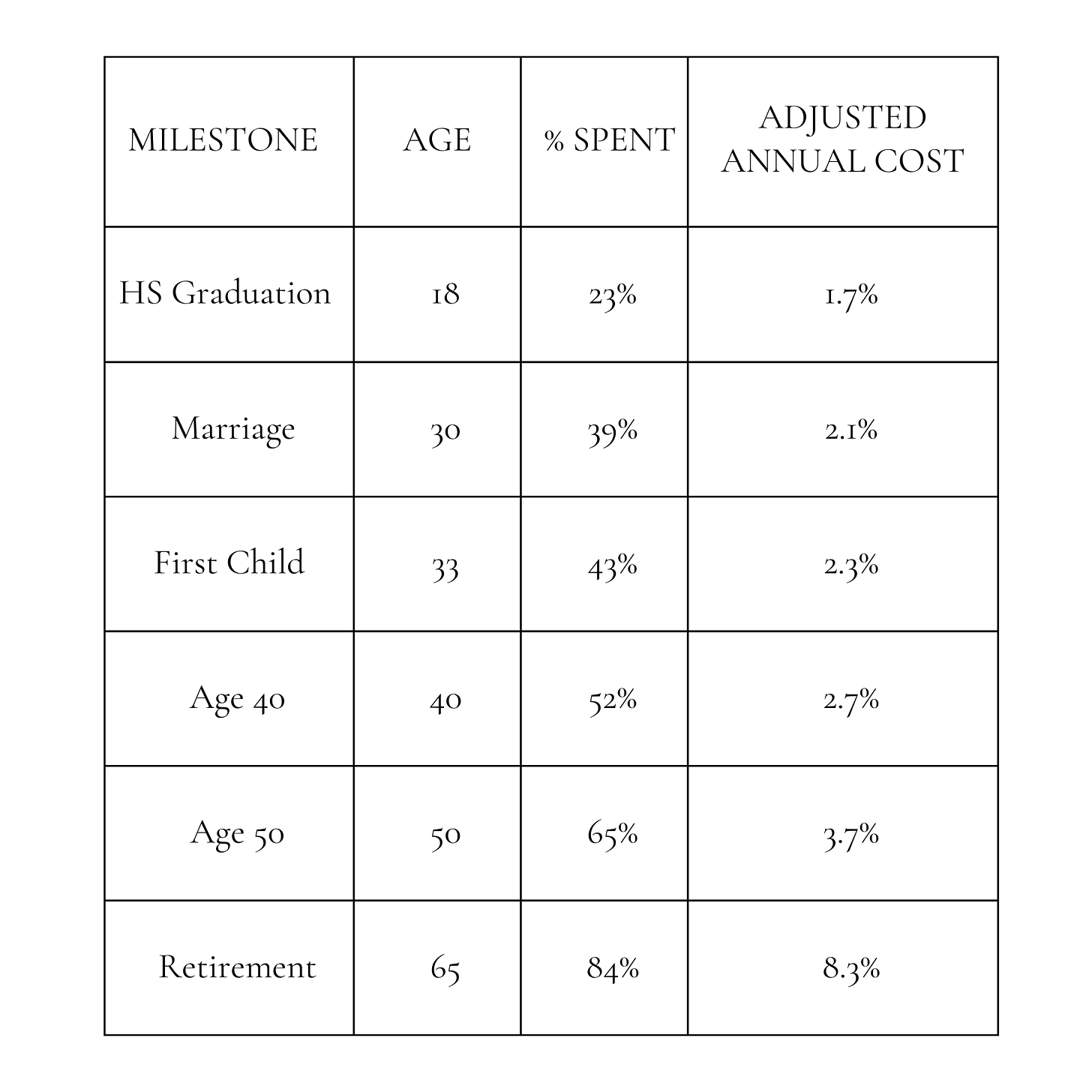1.3%. It's not the interest rate on a financial product, it is not the number of bikers that are kind of outlaw and it is not the percentage of daily nutrition from your cereal. It's the percentage of your life that each year represents in a 77-year lifespan—the average lifespan in the United States, according to the CDC.
I've been reflecting on this a lot lately: my age, these uncertain times, and the many things I still want to accomplish. Each passing year feels more significant, and it's made me wonder: Am I making the most of each 1.3%?
THE WEIGHT OF TIME
Over the past few weeks, I've been ruminating on this number—1.3%. The number came to mind as I reflected on my experiences as a caretaker and my involvement in end-of-life care. Witnessing what the end of life looks like has profoundly shaped how I think about the time I have left and how I want to live it. Not only have I reflected on these experiences, but I've also instinctively made changes that have had a meaningful impact on my own life and happiness, as well as on the lives of others I've had the privilege of interacting with under this new perspective.
Initially, I used my father's 89 lifespan as a guidepost. But as I thought about the broader average lifespan of 77 years, this perspective transformed how I see my time. Seeing the realities of end-of-life care pushed me to say, "I'm going to change things." Yet as I reflected further, I started questioning the timelines I had set for those changes. How much time do I truly have left? That's when I came upon 1.3%—the percentage of life each year represents in a 77-year lifespan—and it hit me how much weight that small number carries.
This realization made me rethink the way we often approach change. Take New Year's resolutions, for example. Waiting until January 1st to make a change means you've just spent 1.3% of your life waiting to start something. Why wait? It's not just about defining what you're going to do—it's about defining when you're going to do it.
When you act with urgency and purpose, each year becomes more than just another 1.3% of your life. It becomes a deliberate and meaningful allocation of your most valuable resource: your time.
EVALUATING PRIORITIES
When I began to consider the 1.3% as a measure of time, it forced me to reevaluate my priorities. How much of my life had I spent on things that didn't align with my values? How much time had I invested in habits, relationships, or obligations that didn't bring fulfillment or growth? These questions weren't easy to ask, but they were necessary.
Reassessing priorities isn't just about what matters most—it's about recognizing what no longer serves you. It's about understanding that every decision, every action, and even every inaction is a choice about how you allocate your time. Do you spend it on things that truly align with your goals, or do you let it slip away on things that drain your energy and focus?
Looking at life through the lens of milestones reveals how time becomes increasingly valuable as we age. Each year costs more as a percentage of the life we have remaining. By the time you reach retirement, each year is over 8% of your remaining life. This highlights why the decisions we make at each stage of life carry increasing weight.
But here's the empowering truth: you can influence what these years look like. By making changes now—whether it's improving your health, prioritizing relationships, or aligning your life with your values—you can make each year more meaningful and impactful. Though the "cost" per year increases, the quality of those years can also increase if you're intentional about how you live them.
The choices you make now aren't just about today—they determine the legacy you'll leave behind. That's why regularly taking stock of your priorities and adjusting them is crucial. The point is to ensure that the 1.3% of your life you're spending each year isn't just passing by—it's working for you.
RELATIONSHIPS AND COMMUNITY
When I started thinking about 1.3%, I realized how much of that time is shaped by the people we choose to spend it with. Relationships are the threads that weave meaning into our lives. Yet, how often do we take them for granted, assuming there will always be more time to reconnect, repair, or nurture?
My work in the divorce space offered me a unique perspective on relationships. I've seen the full spectrum of situations people find themselves in, from loving and supportive partnerships to those that are suboptimal at best and dangerous at worst. Often, people spend 5% or more of their lives in situations that don't serve them—time that could have been spent building something healthier and more fulfilling.
But viewing things through the 1.3% lens becomes empowering. It's a reminder that every year spent in an unhappy or harmful situation is a significant portion of your life. Change doesn't have to wait for a perfect moment—it can start now, even with small, incremental steps. The sooner you take action, the more of your life you can reclaim.
Being intentional with relationships means not only investing in the ones that matter most but also having the courage to step away from those that don't. It's about making sure the people you surround yourself with are aligned with your values and support your growth. Every 1.3% spent with uplifting relationships becomes a meaningful allocation of your most valuable resource: time.
LESSONS FOR THE NEXT GENERATION
The 1.3% perspective isn't just valuable for those reflecting on how they've spent their lives—it's a powerful lesson for younger generations who still have the majority of their years ahead of them. If they embrace this mindset early, they can avoid common mistakes and make the most of their time, especially in their careers.
One of the most important lessons we can pass on is the value of learning from others. Watching the missteps and successes of those who came before us allows younger generations to "arbitrage time." They don't have to spend years figuring out lessons the hard way if they're willing to listen and adapt. In a career context, this means finding mentors, observing peers, and seeking feedback to accelerate growth.
Too often, young professionals fall into the trap of thinking they have time to "figure it out later." But when you break life down into finite percentages, you see that every year spent in a job or role that doesn't align with your passions or purpose is a significant portion of your life. The key questions become: Is this role helping me grow? Am I building skills, connections, and a path that aligns with my long-term vision?
The 1.3% perspective can help them approach their careers with clarity. It encourages them to take calculated risks, seek meaningful work, and invest in opportunities that align with their values. Whether it's pursuing additional education, changing industries, or simply advocating for themselves, their decisions can have a compounding effect on their future.
Ultimately, the greatest gift we can give to the next generation is perspective. By helping them frame their careers and lives through the lens of 1.3%, we equip them to make intentional choices. Their time becomes a resource they invest wisely, creating not just a successful career but a fulfilling life.
MAKE EVERY BIT COUNT
In the beginning, I said that 1.3% isn't the annual growth of an investment. But I've come to realize I was wrong. If you live each year with intention and purpose, it is the annual growth of the most important investment you'll ever make: yourself.
The 1.3% lens isn't just a way to measure time—it's a call to action. It reminds us that every year, every moment, is an opportunity to redefine priorities, strengthen relationships, pursue meaningful goals, and leave a lasting impact. Waiting for the "right time" is simply waiting to lose time.
So, how will you spend your next 1.3%? Will it be another year that passes unnoticed, or will it be the start of something transformative? The choice is yours. Make it count.
This will not make me rich but helps me keep up the fight. It also lets you show your support for retaking America with a movement of sanity and practicality.




